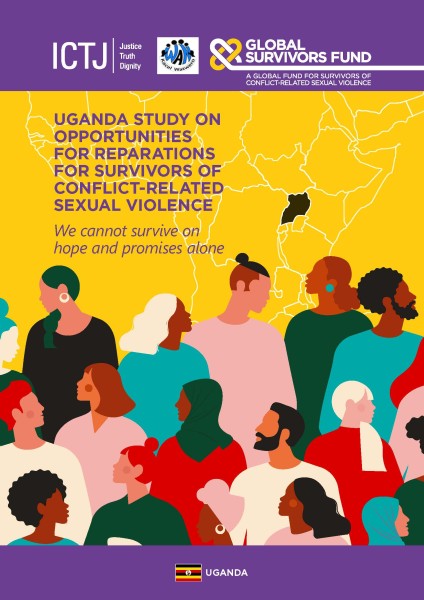Nous travaillons côte à côte avec les victimes pour obtenir la reconnaissance et la réparation des violations massives des droits humains, demander des comptes aux responsables, réformer et construire des institutions démocratiques et prévenir la répétition de la violence ou de la répression.
We Cannot Survive on Promises Alone: Uganda Study on Opportunities for Reparations for Survivors of Conflict-Related Sexual Violence
This report presents findings from a study conducted by ICTJ, the Women’s Advocacy Network, and the Global Survivors Fund to assess the reparative justice needs of victims of conflict-related sexual violence (CRSV) in Uganda. The study is based on interviews and focus group discussions with survivors and other stakeholders. It urges the Ugandan government and relevant actors to implement a comprehensive reparations program that guarantees CRSV victims receive adequate, appropriate, and timely repair.

ICTJ and the Women’s Advocacy Network, in collaboration with the Global Survivors Fund, conducted a study to assess the reparative justice needs of survivors of sexual violence in Northern Uganda, as well as the opportunities for delivering reparations through judicial and administrative processes. The study collects and unpacks victims’ perspectives on and expectations for reparations and interim relief measures in an effort to inform and advance a national, comprehensive reparations program. As part of a multi-country research project, it also offers practical, concrete, and context-specific recommendations to policymakers and other relevant actors at both the national and global levels on the design and delivery of victim-centered reparations.
The study is based on field research involving interviews and focus group discussions with diverse stakeholders, including survivors, policymakers, local government officials, traditional leaders, and civil society actors, as well as extensive desk research examining the nature and scope of the sexual violence crimes committed during the conflict and the lasting harms they caused to victims.
The study shows that little had been done in Uganda to address the enduring consequences of these crimes and the needs of victims. It found that, while reparations are critical to victims’ healing and reintegration into society, the government has failed to provide any form of repair or interim relief to CRSV victims that might help redress the harms they suffered.
The report calls on the Ugandan government and all stakeholders to take urgent action to implement a comprehensive reparations program that guarantees CRSV victims receive adequate, appropriate, and timely repair. In the interim, the report advocates for urgent assistance measures to address the immediate needs of CRSV victims. For these reparative measures to be transformative, victims must fully participate in their design, implementation, monitoring, and evaluation.